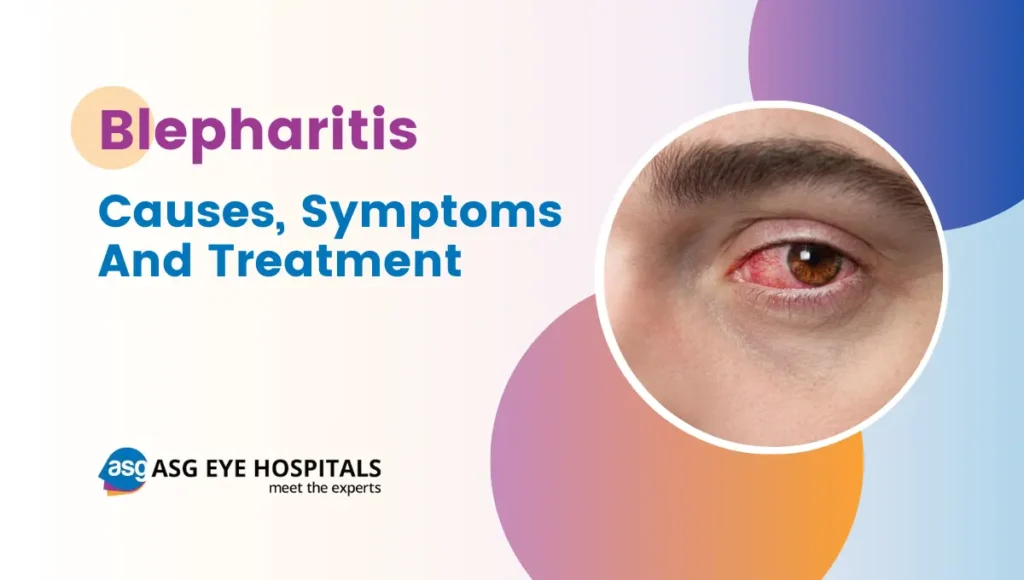What is Blepharitis?
Blepharitis is an eye condition in which the edges of eyelids get swollen and turn dark red. It is very common among individuals who have dandruff and oily skin and happens when the oil glands of the eyes become clogged.
This condition is classified into two types, they are anterior blepharitis and posterior blepharitis.
Anterior blepharitis affects the front edge of the eyelids, it is caused by the bacteria that live on our skin and produce an irritative toxin which causes swelling or inflammation.
Posterior blepharitis affects the inner edge of the eyelids, it occurs when the oil-producing gland (meibomian gland) under the eyelid produces unhealthy and thickened oil.
What are Symptoms?
- Swelling on eyelids
- Redness on eyelids
- Itchiness and irritation
- Crusty eyelashes
- Dry eyes
- Watery eyes
- Sensitivity to light
- Stinging or burning sensation in eyes
- Blurry vision that generally improves with blinking
- Flaking of skin around eyes
What are Blepharitis Causes?
- Bacterial infection- One of the primary causes of blepharitis is the presence of bacteria, particularly Staphylococcus aureus, on the eyelids. This can lead to an infection and subsequent inflammation.
- Seborrheic dermatitis- Individuals with seborrheic dermatitis, a skin condition characterized by red, scaly skin, are more prone to developing blepharitis.
- Meibomian Gland Dysfunction- Dysfunction of the meibomian glands, which are responsible for producing the oily part of tears, can contribute to the development of blepharitis.
- Rosacea- People with rosacea, a skin condition that causes redness and visible blood vessels, may be at a higher risk of developing blepharitis.
What are the Best Treatments for Blepharitis?
- Lid hygiene- People with rosacea, a skin condition that causes redness and visible blood vessels, may be at a higher risk of developing blepharitis.
- Warm compresses- Applying warm compresses to the eyes can help loosen the oils in the Meibomian glands, relieving symptoms and promoting healing.
- Topical antibiotics- In cases where bacterial infection is present, topical antibiotics may be prescribed to reduce inflammation and combat the infection.
- Artificial tears- Lubricating eye drops or artificial tears can help alleviate dryness and discomfort associated with blepharitis.
- Omega 3 supplements- Some studies suggest that omega-3 fatty acid supplements may have a beneficial effect on the symptoms of blepharitis by improving the quality of the tear film.
Diagnosis of Blepharitis:
Diagnosing blepharitis involves a complete eye test by an eye care specialist. The key steps involved in the diagnosis of blepharitis are:
- Eye care doctors take a detailed history of the patient’s symptoms and information about their general health, eye care habits, and skin condition
- A clinical examination will be conducted to evaluate the appearance and condition of the eye.
- A detailed magnified view of eye structures, meibomian glands, and eyelid margin by slit lamp examination
- special dyes aid in evaluating tear film quality. Testing may include swabs or cultures to identify bacteria or microscopic examination for Demodex mites if needed.
- Meibomian gland functionality is assessed through techniques like meibography. The eye care professional also looks for signs of associated conditions such as rosacea or seborrheic dermatitis
- Then, the doctor will recommend treatment options which may depend on the causes of the condition.
While blepharitis can be a persistent and bothersome condition, proper management and consistent eye care can help alleviate symptoms and improve overall eye health. If you suspect you have blepharitis or are experiencing persistent eye discomfort, it is crucial to consult with the best eye specialist in India for a comprehensive evaluation and personalized treatment plan. Understanding the causes and symptoms of blepharitis empowers individuals to take proactive steps in maintaining their eye health and well-being.




